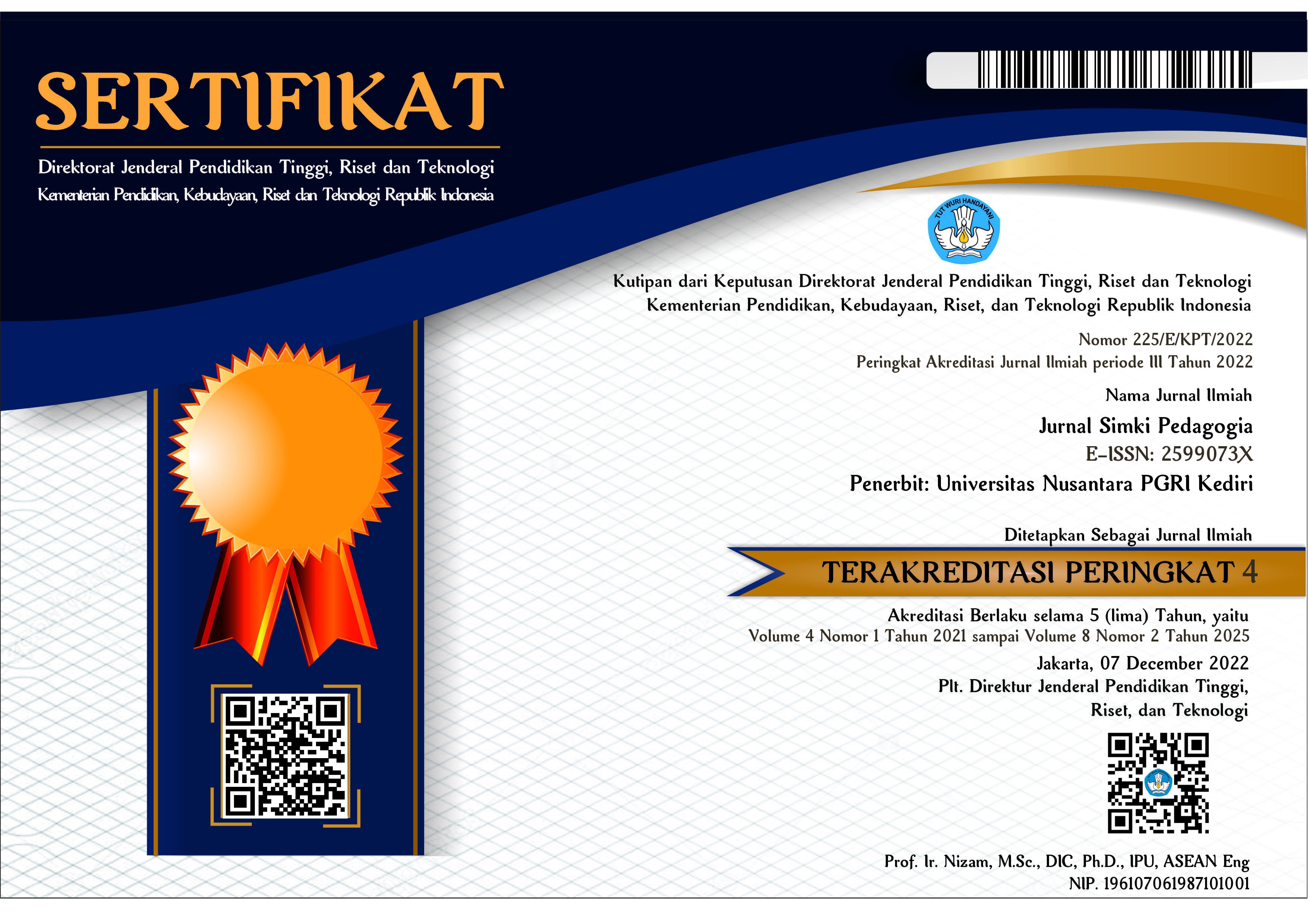Pengaruh Learning Cycle dengan Pendekatan Contextual Teaching Learning terhadap Keterampilan Berpikir Kritis pada Pembelajaran Sains
 Abstract views: 331
,
Abstract views: 331
,
 PDF (Bahasa Indonesia) downloads: 203
PDF (Bahasa Indonesia) downloads: 203
Abstract
Science learning aims to study natural phenomena systematically, involving high-level manipulative thinking processes to give physical meaning to natural phenomena around us. The main problem in science learning is students memorize science concepts, they need to be trained to solve problems and interpret natural phenomena in everyday life. One learning approach to solving problems is the Contextual Teaching and Learning (CTL) approach with the Learning Cycle strategy. The research objective is to determine the effect of the Learning Cycle with the Contextual Teaching and Learning Approach on critical thinking skills in science learning. This research uses a quasi-research method with two experimental classes. The sampling technique is cluster random sampling. The research sample was two classes in a state school in Yogyakarta. Data analysis includes the data description stage, analysis prerequisite testing stage, and hypothesis testing stage. The research results show differences in the average critical thinking skills of the Learning Cycle strategy with the CTL approach and laboratory work..
Downloads
References
Abrahams, I., & Reiss, M. J. (2012). Practical work: Its effectiveness in primary and secondary schools in England. Journal of Research in Science Teaching, 49(8), 1035–1055. https://doi.org/10.1002/tea.21036
Adah Miller, E., Berland, L., & Campbell, T. (2024). Equity for Students Requires Equity for Teachers: The Inextricable Link between Teacher Professionalization and Equity-Centered Science Classrooms. Journal of Science Teacher Education, 35(1), 24–43. https://doi.org/10.1080/1046560X.2023.2170793
Avraamidou, L. (2014). Studying science teacher identity: current insights and future research directions. Studies in Science Education, 50(2), 145–179. https://doi.org/10.1080/03057267.2014.937171
Bevan, B. (2017). The promise and the promises of Making in science education. Studies in Science Education, 53(1), 75–103. https://doi.org/10.1080/03057267.2016.1275380
Christenson, N., & Walan, S. (2023). Developing Pre-service Teachers’ Competence in Assessing Socioscientific Argumentation. Journal of Science Teacher Education, 34(1), 1–23. https://doi.org/10.1080/1046560X.2021.2018103
Ekawati, R., Setiawan, A., Wulan, A. R., & Rusdiana, D. (2020). Development of concept essential in kinematic topics. Journal of Physics: Conference Series, 1521(2), 022019. https://doi.org/10.1088/1742-6596/1521/2/022019
Fitriani, F. (2011). Analisis Penguasaan konsep dan Sikap siswa Kelas 8 Pada Pembelajaran Zat Aditif Pada Makanan Menggunakan Pendekatan Kontekstual. Universitas Pendidikan Indonesia. https://repository.upi.edu/112355/
Gericke, N., Högström, P., & Wallin, J. (2023). A systematic review of research on laboratory work in secondary school. Studies in Science Education, 59(2), 245–285. https://doi.org/10.1080/03057267.2022.2090125
Herranen, J., & Aksela, M. (2019). Student-question-based inquiry in science education. Studies in Science Education, 55(1), 1–36. https://doi.org/10.1080/03057267.2019.1658059
Jack, B. M., & Lin, H. shyang. (2017). Making learning interesting and its application to the science classroom. Studies in Science Education, 53(2), 137–164. https://doi.org/10.1080/03057267.2017.1305543
Johnson, E. B. (2011). Contextual Teaching Learning menjadikan kegiatan belajar mengajar mengasyikkan dan bermakna. Kaifa Learning. http://library.fip.uny.ac.id/opac/index.php?p=show_detail&id=3125
Jons, L., & Airey, J. (2023). An Agreed Figured World–Conceptualizing Good Physics Teachers in a Finnish University. Journal of Science Teacher Education, 35(1), 5–23. https://doi.org/10.1080/1046560X.2023.2169654
Krakehl, R., & Kelly, A. M. (2021). Intersectional analysis of Advanced Placement Physics participation and performance by gender and ethnicity. Physical Review Physics Education Research, 17(2), 20105. https://doi.org/10.1103/PhysRevPhysEducRes.17.020105
Kulgemeyer, C. (2018). Towards a framework for effective instructional explanations in science teaching. Studies in Science Education, 54(2), 109–139. https://doi.org/10.1080/03057267.2018.1598054
Lee, V. R. (2023). Learning sciences and learning engineering: A natural or artificial distinction? Journal of the Learning Sciences, 32(2), 288–304. https://doi.org/10.1080/10508406.2022.2100705
Mertler, C. A., & Charles, C. M. (2005). Introduction to educational research (5th ed.). Pearson Education.
Narayanan, S., Sarin, P., Pawar, N., & Murthy, S. (2023). Teaching research skills for experimental physics in an undergraduate electronics lab. Physical Review Physics Education Research, 19(2), 20103. https://doi.org/10.1103/PhysRevPhysEducRes.19.020103
Ogegbo, A. A., & Ramnarain, U. (2022). A systematic review of computational thinking in science classrooms. Studies in Science Education, 58(2), 203–230. https://doi.org/10.1080/03057267.2021.1963580
Pande, P., & Chandrasekharan, S. (2017). Representational competence: towards a distributed and embodied cognition account. Studies in Science Education, 53(1), 1–43. https://doi.org/10.1080/03057267.2017.1248627
Tang, K. S. (2022). Material inquiry and transformation as prerequisite processes of scientific argumentation: Toward a social-material theory of argumentation. Journal of Research in Science Teaching, 59(6), 969–1009. https://doi.org/10.1002/tea.21749
Webb, D. J., & Paul, C. A. (2023). Attributing equity gaps to course structure in introductory physics. Physical Review Physics Education Research, 19(2), 20126. https://doi.org/10.1103/PhysRevPhysEducRes.19.020126
Copyright (c) 2024 Ratna Ekawati, Widiasih, Aynin Mashfufah, Intan Sari Rufiana

This work is licensed under a Creative Commons Attribution 4.0 International License.

Jurnal Simki Pedagogia : https://jiped.org/index.php/JSP/index is licensed under a Creative Commons Attribution 4.0 International License.
















